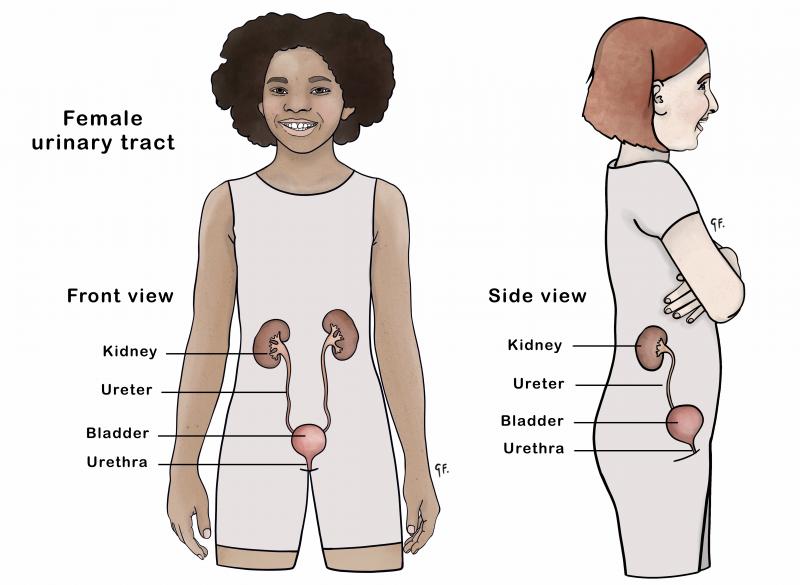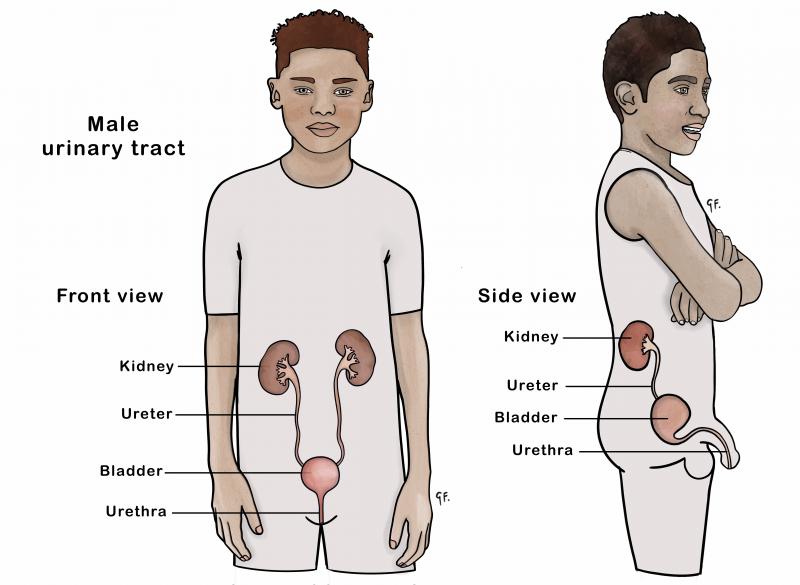

PSGN is a kidney disease that can happen 10 to 14 days after a throat or skin infection caused by Streptococcus (a type of bacteria).
The urinary tract is the kidneys, ureters, bladder, and urethra.
The kidneys filter and remove waste and water from the blood to produce urine. The urine travels from the kidneys down 2 narrow tubes called the ureters. The urine is then stored in the bladder.
When your child does a wee, urine flows out of the body through the urethra, a tube at the bottom of the bladder. The opening of the urethra is at the end of the penis in boys and in front of the vagina in girls.
Front and side view of the female urinary tract

Front and side view of the male urinary tract

Your child's infection-fighting (immune) system causes PSGN. When your child's body tries to fight infection, their immune system makes antibodies. Antibodies help identify and destroy bacteria. In children with PSGN, the dead bacteria and antibodies become trapped in the filters of the kidneys (glomeruli). This causes inflammation, which slows down the filters of the kidneys, making it harder for them to make urine and get rid of the waste.
You cannot 'catch' PSGN as it is caused by the body's own infection-fighting (immune) system. But, streptococcal infections (either from the skin or throat) can spread from person to person.
These can vary. Some children may have no symptoms, or they may have the following sympoms.
Your child have blood in their wee (haematuria). This may make the wee dark or brown coloured. Sometimes it is only discovered after a urine test.
Your child may also have protein in their wee (proteinuria).
Your child may have swelling (oedema). Fluid collects in the tissues and can cause puffiness around the eyes or the ankles.
Your child may wee less often or stop weeing completely.
Your child may have high blood pressure causing headaches (hypertension).
Your child may also be more tired.
Your child's doctor may diagnose your child with PSGN after checking your child's signs, symptoms, and blood and urine tests.
If your family doctor thinks your child might have PSGN, your child will need to go to hospital.
Doctors will check your child's wee for protein and blood. Your child will also get a blood test to check kidney function, signs of a recent streptococcal infection and the effect of the infection on the immune system. Doctors may also check for other things in the blood to rule out other conditions and different causes of glomerulonephritis.
PSGN gets better on its own, so treatment focuses on relieving symptoms and trying to prevent complications. Your child will need to have a low salt diet. The doctor may give your child a maximum amount they can drink each day. Your child may need medicine to bring their blood pressure down. They may also need medicine to encourage their kidneys to get rid of salt and water. The doctor will usually give your child antibiotics to treat any streptococcus bacteria left in their body.
Your child can usually leave hospital once their blood pressure is back to normal, or controlled with medicine.
Most children make a full recovery within a few weeks.
The blood you can see in the wee is usually gone in 2 weeks. But, urine tests may still show blood in your child's wee for up to 2 years.
The high blood pressure comes down in about 4 weeks. Some children may need to take medicine for their blood pressure.
Your child will continue to have blood pressure, weight and urine checks once they've left hospital. Once these checks have finished, it is important to go back to your family doctor if you notice any PSGN signs and symptoms again.
If you're worried about your child's health at any stage, see your family doctor.
Most children make a complete recovery. But, for a small number of children, the disease will continue and for an even smaller number of children the disease may get worse. The main things your doctor will look out for are:
It is important your child takes any prescribed medicine. It is also important you take your child to checkups with the doctor. Your child will have blood pressure, weight and urine checks.
If streptococcal skin or throat infections are discovered early, they can be treated with antibiotics, which may prevent the development of PSGN.
Boon, N., Davidson, S. (eds). 2006. Davidson's principles and practice of medicine. 20th Edition. Edinburgh: Churchill Livingston.
Kliegman, R., Behrman, R., Jenson, H., Stanton, B. (eds). 2007. Nelson textbook of pediatrics. 18th Edition. Philadelphia, PA: Saunders.
Starship Children's Health. November 2021. Clinical Guidelines: Glomerulonephritis [1].
UpToDate: PostStreptococcal Glomerulonephritis [2].
Wong W, Morris MC, Zwi J. May 2009. Outcome of severe acute post-streptococcal glomerulonephritis in New Zealand children. Pediatric Nephrology. 24(5):1021-6.
Wong W, Lennon DR, Crone S, Neutze JM, Reed PW. June 2013. Prospective population-based study on the burden of disease from post-streptococcal glomerulonephritis of hospitalised children in New Zealand: Epidemiology, clinical features and complications [3].
Urinary tract illustrations by Dr Greta File. Property of KidsHealth.
Illustration of normal kidney and kidney affected by poststreptococcal glomerulonephritis by Dr Greta File. Property of KidsHealth.
This page last reviewed 13 June 2022.
Email us [4] your feedback
Links
[1] https://starship.org.nz/guidelines/glomerulonephritis/
[2] https://www.uptodate.com/contents/poststreptococcal-glomerulonephritis
[3] https://pubmed.ncbi.nlm.nih.gov/23782011/
[4] https://kidshealth.org.nz/contact?from=http%3A%2F%2Fkidshealth.org.nz%2Fprint%2F502%3Flanguage%3Dzh-hans